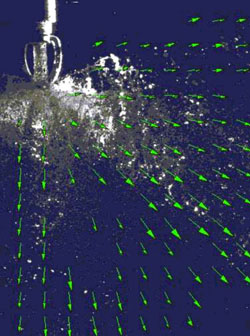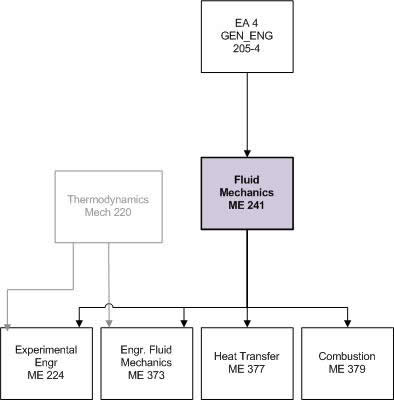Master's and PhD Degrees / Courses / Course DescriptionsMECH_ENG 241: Fluid Mechanics I
VIEW ALL COURSE TIMES AND SESSIONS
Prerequisites
MATH 234-0 (may be taken concurrently) and GEN_ENG 205-4Description
 The flow of fluids is important in many applications ranging from blood flow in the human body to air flow over the wing of a jet aircraft. As a result, this is a required course for mechanical engineering students. Most students in environmental engineering, civil engineering, biomedical engineering, and chemical engineering take this course or one very similar to it. Undergraduates take this course at the end of their second year or at the beginning of their third year. The course uses integral calculus and differential equations, so these courses are prerequisites. It also helps to have taken physics and thermodynamics prior to this course.
The flow of fluids is important in many applications ranging from blood flow in the human body to air flow over the wing of a jet aircraft. As a result, this is a required course for mechanical engineering students. Most students in environmental engineering, civil engineering, biomedical engineering, and chemical engineering take this course or one very similar to it. Undergraduates take this course at the end of their second year or at the beginning of their third year. The course uses integral calculus and differential equations, so these courses are prerequisites. It also helps to have taken physics and thermodynamics prior to this course.
Who Takes It
This course is taken by both mechanical and biomedical engineers, typically in the sophomore or junior years.
Lectures
This course meets four times per week for 50-minute lectures.Labs
There are three two-hour labs during the course to provide practical experience in fluid flow and measurement. Labs cover the following topics:
- Fluid statics: buoyancy, hydraulic jack, force on a submerged plate, manometry
- Fluid Dynamics: force of a fluid jet, drag on a cylinder in a wind tunnel
- Pipe Flow: frictional losses in pipes, pressure transducers, flow meters, turbulence
Topics
- Dimensional analysis
- Introduction to fluid properties (density, viscosity, surface tension)
- Fluid statics
- Manometry
- Buoyancy
- Forces on submerged surfaces
- Elementary fluid dynamics -- the Bernoulli equation
- Control volume analysis
- Mass conservation (mass cannot be created or destroyed)
- Momentum conservation (force = mass * acceleration)
- Energy conservation (energy is conserved)
- Practical applications
- Differential fluid flow analysis
- Continuity (mass conservation)
- Navier-Stokes equation (momentum conservation)
- Flow in pipes
- Laminar flow
- Turbulent flow
- Frictional losses in pipes and pipe fittings
Textbook
 Fundamentals of Fluid Mechanics, 7th Ed., by Munson, Young, and Okiishi, Wiley 2009
Fundamentals of Fluid Mechanics, 7th Ed., by Munson, Young, and Okiishi, Wiley 2009
Assessment/evaluation
Assignments and evaluation methods vary by instructor and may include lab reports, homework, design problems, quizzes, and exams.
Advanced study
Students interested in fluid mechanics can take the following courses:
Contact
Professor: Sandip Ghosal
Email: s-ghosal@northwestern.edu
Professor: Mitra Hartmann
Email: m-hartmann@northwestern.edu

